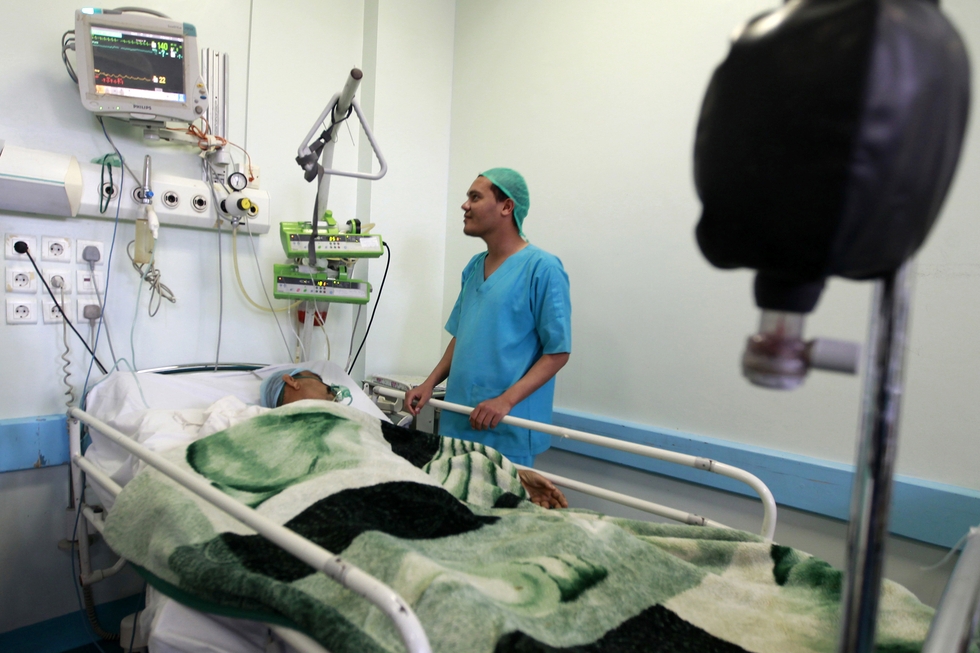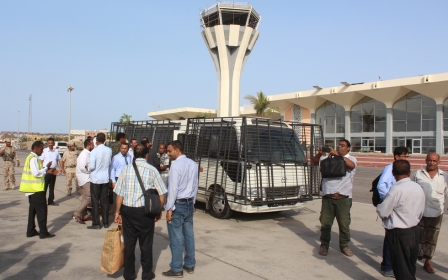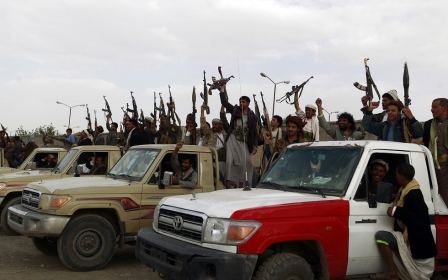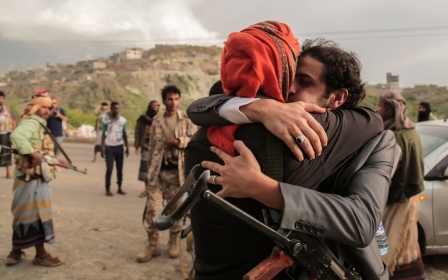Yemen's hospitals in crisis as doctors flee country

As 28-year-old Rayan al-Azazi drove a bus with 12 people north from Taiz to Yemen’s capital Sanaa in early May, he and his friends were involved in a horrific car crash. Three of his fellow passengers were killed immediately, and Azazi was left with serious brain injuries.
The survivors were rushed to the nearby state-run hospital in Thammar to be treated for cuts, bruises and broken bones. Azazi, however, continued to suffer because the hospital lacked a neurologist. When Azazi’s brother Abdulqader arrived at the hospital, after a 200km journey and some 20 checkpoints, he found his brother still in pain.
"When I arrived, I asked the doctors there about my brother's health. But they said they couldn’t help, as there were no neurology specialists there. They said I would have to take my brother to Sanaa," Abdulqader Azazi told Middle East Eye.
Before the war there had been just one neurology specialist at the hospital – but when the bombing began he left the country. The hospital could not find a replacement since there are so few specialists in the field inside Yemen, he said.
Azazi expressed optimism about finding doctors in the capital, which is less than three hours’ drive from Dhamar. But when he arrived in Sanaa he was shocked.
"I moved my brother into more than one hospital in Sanaa. I finally found a surgeon specialising in neurology, but he was busy. My brother couldn’t hold on any more - he died before seeing the doctor."
As Azazi told of the death of his only brother, tears fell uncontrollably from his eyes. "My brother got engaged two months ago. He was going to Sanaa to look for work in Sanaa to help him afford to get married - but in the end death was closer to him than marriage."
Most of the surgeons in Yemen come from abroad, and so many have left since the conflict broke out that the country’s healthcare system is now in dire need. Since the war escalated in March 2015, with the start of a Saudi-led bombing campaign, most of the 1,200 non-Yemeni health practitioners have left the country, according to the World Health Organisation’s Yemen branch.
Even those working for Doctors Without Borders (MSF) face danger. In December, an air strike from the Saudi-led coalition struck an MSF mobile clinic that wounded seven people.
‘Angels of mercy’
This dire need is well known to the Yemeni health ministry, but permanent solutions to the crisis are proving too costly and unworkable.
Ghazi Ismail, Sanaa’s pro-Houthi health minister, told MEE that not just foreign doctors have rushed to leave the country in the past year – Yemeni doctors have also fled the war in large numbers.
"We are trying hard to find Yemenis to replace the foreign doctors, but we cannot find enough alternatives, since most of the foreigners have rare specialities," Ismail told MEE.
He said the ministry does not have enough specialists as a result of the war, which has jeopardised those with complicated medical conditions.
"Hospitals have to apply to the ministry if they need a doctor with a specific speciality, and then we try to find the alternative if we have one. But nowadays we don’t usually have alternatives."
Around 1,200 foreign practitioners have left Yemen since March 2015, and of those who remain, many work in places like Hadramout province and other areas where the effects of the war are less stark. Few work directly in the conflict zones most affected by the conflict between rebel Houthis and others and the government.
Many of the foreign practitioners were working in rural areas, so people living outside big cities have been worst affected by the doctors’ exodus.
Ismail said the authorities are doing their best to stem the drain of Yemeni specialists.
"Yemeni doctors who work in less-common specialities can earn more money abroad, so many of them have left Yemen to other countries like Saudi Arabia. We are now trying to get donations from international organisations to pay those doctors more and bring them back to Yemen," Ismail said.
With fewer than 2,000 specialists left in the whole country, less than half of Yemen’s healthcare needs are currently being met.
Some, though, have continued to work in the conflict zones despite having better offers from abroad, saying they want to help the victims of war.
Mazen Mohammed, is a Yemeni who works as an orthopaedic surgeon at the state-run Sheikh Khalifa hospital in Taiz, where patients can get treatment from him for free. He has been offered work in at least two other countries but believes he is more needed in Yemen than anywhere else.
"We are the angels of mercy. We can’t think of money nowadays. Yemen needs us, so we have to focus on helping the victims of the war. Allah will not forget us," Mohammed told MEE.
Travelling abroad
It’s not just people with acute injuries who are suffering. Wadee Sinan, 45, told MEE that a lack of surgery for his chronic heart condition has left him waiting for certain death.
"Many Yemeni and foreign doctors have left Yemen during the last year. There are still doctors, but cardiologists are impossible to find now," Sinan told MEE.
Sinan cannot afford to travel abroad, so he remains at home waiting for death to come at any time. "Many patients have died because they couldn’t get surgery in Yemen and they cannot travel abroad. I will be one of those people who die at home."
The leadership of the anti-Houthi resistance, with assistance from the Yemeni government and the Saudi-led coalition, have helped injured resistance fighters travel abroad to seek proper medical care, but civilians told MEE they have not received the same support.
Though not all wounded pro-government fighters travel to Saudi Arabia for treatment, a significant portion do. Official figures remain unknown at this point.
Houthi shelling in February injured Hani Fadhl, 26, from the al-Shamasi neighbourhood in the besieged city of Taiz, in the shoulder. When doctors in Yemen were unable to treat him, he resorted to selling family heirlooms to fund his travel to Jordan.
"Many resistance fighters have gone abroad for treatment at the government's expense, but the resistance refused to help me because I am not a fighter. In the end my mother had to sell some jewellery to help me," Fadhl said.
Sinan, the 45-year-old, who said he has no hope that his life will be saved, said: "I do not believe the war will end soon, and also I do not think that new doctors will come to help the patients in Yemen, but I believe that Allah knows everything, and if we lose our lives in this world, Allah will award us in the afterworld."
Middle East Eye propose une couverture et une analyse indépendantes et incomparables du Moyen-Orient, de l’Afrique du Nord et d’autres régions du monde. Pour en savoir plus sur la reprise de ce contenu et les frais qui s’appliquent, veuillez remplir ce formulaire [en anglais]. Pour en savoir plus sur MEE, cliquez ici [en anglais].




